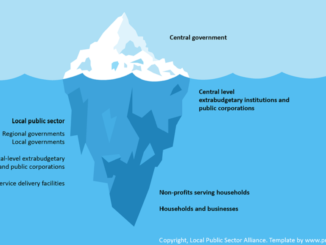
LPSA’s Regional Working Group on Europe & Central Asia (ECA) Open Meeting took place on September 11, 2024, (10:00 EDT/ 15:00 BST/ 16:00 CEST/ 19:00 UZT). The meeting was opened and moderated by Gabor Peteri, who serves as one of the co-chairs of the working group. He introduced the meeting as a start of a professional exchange on selected issues of the relationship between decentralization and regional development.
Marjan Nikolov from the Center of Economic Analysis (North Macedonia) presented a policy paper on Balanced Regional Development and Fiscal Decentralization in North Macedonia. The paper emphasized the country’s significant regional imbalances in development, measured by the GDP per capita of the major planning regions (NUTS 2). Despite a decentralization initiative launched in 2016, it is evident that both fiscal decentralization and regional development need to be examined together for effective policies. The study examined the Beta-convergence of different regions, revealing that regions follow divergent trajectories conditioned on factors such as population density, urbanization, and labor force participation. Ethnic fragmentation has no statistically significant influence on the convergence of planning regions. The statistical analysis on the relationship between fiscal decentralisation and balanced regional development revealed a significant positive correlation of increased local revenues and reduction of inequalities; while a negative one on the impact of own source revenue raising or population decline. Policy recommendations for the central government are to increase economic growth potential in less developed regions and to consider transferring funds between regions or even to exclude more developed regions from the transfer schemes until absolute convergence is achieved.
During the open discussion, Marjan Petreski from The University of American College (North Macedonia) as an invited commentator welcomed the specific decentralised data-based analytical approach of the report. He confirmed the main statements on the relationship of decentralization and balanced regional development: a) higher revenue decentralization is associated with lower regional inequality; b) increased reliance on local revenues in underdeveloped regions can exacerbate regional inequality, as poorer regions lack the economic potential to generate sufficient revenues; c) better budget realization in wealthier regions with greater fiscal capacity increase regional inequality.
The second part of the meeting introduced the Standard Expenditure Needs (SEN) and Standard Level of Outputs (SLO) methodology, which was developed for the Italian and Lithuanian Governments and endorsed by the European Commission. The standard expenditure needs of a local government refer to the level of expenditure required to finance a standard level of outputs, assuming efficient managerial choices. On the other hand, the standard level of outputs of a local government is a measure of the potential demand for local services that is compatible with the characteristics of the local population and the socio-economic context. They might differ by clusters, identified as statistically meaningful groups of municipalities.
Vieri Ceriani, President of LAFIS, Laboratorio Fiscale (Italy) introduced the Italian experience in estimating expenditure needs for municipalities and its incorporation in the fiscal equalization system. The gap financing model replaces the initial “ministerial” approach by developing a more comprehensive approach with a wide range of variables and using statistical methods. The process of determining standard expenditure needs involves several steps at both technical and institutional-political levels. It includes identifying municipal functions, collecting data, estimating expenditure parameters, and receiving endorsements from relevant committees and government bodies. The equalization process involves calculating standard expenditure needs and fiscal capacity, determining the fiscal gap for allocating equalization subsidies to municipalities.
Municipal service performance indicators are used to assess each municipality’s expenditure and output levels, categorizing them into a four-quadrant model for evaluation. A joint assessment of local government expenditures and service outputs provides a useful benchmarking tool for municipalities. The general public has also access to this information through the Open Civitas application.
Francesco Porcelli from the University of Bari “Aldo Moro” (Italy) highlighted the Lithuanian experiences in developing an equalization system for municipalities. The process involved defining the services to be analyzed, collecting data, estimating standard expenditure needs and assessing the performance of each municipality. The estimated services included general state services, housing and utilities, recreation, culture and religion, education, and social security. Cluster analysis identified diverse results by the four groups: big cities, predominantly urban areas, predominantly rural areas, and resort areas.
Dr. Natalija Kazlauskienė, Advisor to the Prime Minister of the Republic of Lithuania, during her discussion, emphasized, that the tailored methodology in Lithuania has led to improved budget analysis, data collection, and access to municipal data. It has implications for policy development at the municipal level and in government grant allocation, although it is influenced by political priorities. A lack of service efficiency data prompted the development of a national Life Quality Index in Lithuania. The standardisation offers practical considerations based on available data but may not be suitable for analyzing radical policy changes lacking historical context (e.g. of newly devolved functions). Natalija concluded that collaboration with institutions is crucial for developing methodologies in Lithuania and Italy.
Gábor Péteri who serves as one of the co-chairs of the working group concluded the meeting by scheduling the next quarterly meeting on 11 December 2024 on digitalization at local governments.
A video of the meeting is available on YouTube. The links below provide access to the video segments of the different agenda items.
| Agenda Item | Contributor | Slides |
| 1. Welcome and Introduction | Gabor Peteri ECA Working Group Co-Chair | N/A |
| 2. Regional development and decentralization in North Macedonia | Marjan Nikolov Center for Economic Analyses | View |
| 3. Discussant and Q&A | Marjan Petreski Professor, University American College Skopje | N/A |
| 4. Benchmarking municipal performance: Standard Expenditure Needs and Standard Level of Output method (experience in Italy and Lithuania) | Francesco Porcelli University of Bari “Aldo Moro” Vieri Ceriani President of LAFIS, Laboratorio Fiscale | View |
| 5. Discussant and Q&A | Dr. Natalija Kazlauskienė Advisor to the Prime Minister of the Republic of Lithuania Regional policy and municipal development | N/A |
| 6. Closing Remarks & Next Steps for the Working Group | Gabor Peteri | N/A |
The next ECA webinar is scheduled on December 11, 2024 – Register Here.
Reminder: You can join any LPSA Expert Working Group free of cost and receive reminders and updates by opting-in to one or more working groups as part of your LPSA Membership registration.



